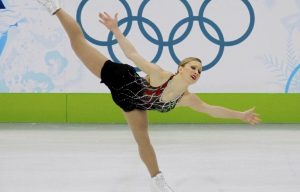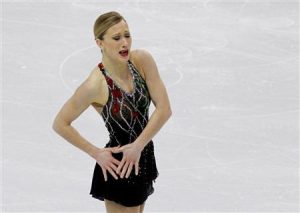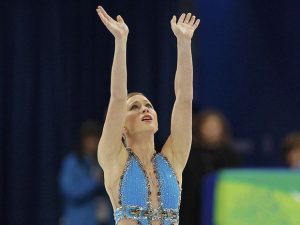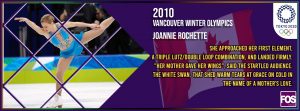“I had nothing left in me. And I felt it toward the last minute, but I think I really gave everything I had.”
Typically, gold medalists are the spotlights in Olympics. But back in the 2010 Vancouver Winter Olympics, a bronze medalist was highlighted for a legitimate reason.
Sometimes life meets us with tragic turmoil. These are inevitable. But it is in these moments, where some heroes are born. Just like the phoenix, who bursts into flames and rises from ashes. Joannie Rochette the “Little Rocket” of Canada, is one of those.
This ice princess was born on the 13th January 1986, in a small village in Canada. Joannie began skating as soon as she started to balance her body stoutly on ice, at age of two. When she was five, she enjoyed watching Olympic Games through the television screen and visualized herself on the podium. She trained under various coaches before settling on Manon Perron, with whom she shared her outlandish victory. At 16, she won the first of six Canadian championships. Her score of 123.12 was the world’s best free skate score so far that year. With all her records and potentials, Canadians put great hopes on Joannie, knowing that she will bring glory to the country in the women skating event. She too was equipped for a facile victory, unaware of the peril ahead.
Everything was normal before the 21st Sunday, just two days before the grand day, her father called her at midnight, informing the news of her mother, 55-year-old Therese Rochette’s unexpected sudden death due to a severe heart attack. After hearing the news, Joannie went right away to the hospital with a vague. But instead of seeing her mother alive, she viewed the body. This peerless loss left a hole in her heart. On the other hand, media, reporters, and millions of sports enthusiasts’ eyes were focused on her. The whole country waited for her final decision. Joannie knew that only two days were left to make out her mind, but she also knew that thousands of her country’s people’s hopes were on her shoulder. She was given whole freedom to make her decision, where she could have easily given up. But without any more loitering, she took the audacious decision of confronting one of the best women’s fields. She took the risk by not giving up her behoove. From that minute onward she seized and held back all her emotions. She practiced in the following two days with an ongoing war of emotions inside. Later her coach admitted that she didn’t sleep or eat well during the practice sessions. But Joannie hid all her trauma and distress from the public.
And the day came for her short program. With the solace of her coach, Manon Perron, who was like a second mother to her, Joannie took few deep breaths and stepped on the home-ice, while all eyes were on her. In a minute her body was in sync with the ecstatic music. But her blank visage mirrored her inner emotional state. Holding back tears, she landed a couple of strong triple flip jumps firmly, putting the whole audience in a jaw-dropped situation.

After a fabulous maneuver, she ended her performance, with a 71.36 of a personal best, marking her place as the third-highest. But then Her raw emotions were no longer steady. At the end of the performance, she burst into tears. Her glistening tears drenched the burning aura around her.

The very next day she braced herself for the final, long program. With the help of the cheerful audience, once again she showed her mental power, with a fabulous performance. And ended it in a pose, where she held her hands directing to the sky. With a combined total of 202.64 points, she reached the bronze medal. And marked her name, in Canada’s Olympic history, as the first woman to win an Olympic medal in women’s figure skating ever since after 1988.

It was only two astounding days for the audience. But for Joannie, it was an unforgettable odyssey, where she turned tragedy into triumph. The competition not only checked her physical strength but her mental strength too. While carrying the medal on her neck, she would’ve felt pity. Because that one person who had been along the way for all those years, supporting her in the ups and downs, wasn’t there to share the victory with her. But if her mother would’ve been there, she would be immensely proud of her daughters’ brave act of putting her country’s pride first over her own emotional needs. Joannie dedicated her triumph to her dead mother. Saying,
“Dear mom, I wish you had been there.”
Joannie’s fearless act despite her endures, melted millions of hearts all over the world. Especially she became not just an athlete but a heroine to people in Canada. At the closing ceremony, she got the chance to carry the maple leaf, despite there were plenty of gold medalists for Canada. After the Olympics, she was awarded many times. But the best award was her victory over her own overpowering emotions.
The passion, self-control, dedication, courage, and most importantly the aplomb that Joannie had, represents the spirit of the Olympics. Olympics is not just a rivalry that athletes compete in. But It’s a place where most of them find their inner powers.
References:
- https://www.britannica.com/sports/Olympic-Games/Vancouver-British-Columbia-Canada-2010#ref1125413
- https://www.csmonitor.com/World/Olympics/2010/0224/Joannie-Rochette-figure-skating-s-moment-beyond-medals
- http://edition.cnn.com/2010/SPORT/02/24/olympics.rochette/index.html
Image Courtesies :
- Featured image: https://bit.ly/2X2jgEl
- Content Image 1: https://bit.ly/3ytq7UZ
- Content Image 2: https://bit.ly/37tQ1vS
- Content Image 3: https://bit.ly/2VsG0g8
- Content Image 4: https://bit.ly/3yt8zbC



